2006 Welsh Regional Championships - Championship Section retrospective
23-Mar-2006BAYV made it five in a row here, but was there any sign that they are about to have their hegemony challenged?
There appears to be no end in sight to the hegemony of the Buy As View Band here in Swansea at the Regional Championships.
Even after giving a performance that by their recent standards could certainly be classed as ‘non vintage' they were still a class above the rest of a fragmented Welsh field of rivals and deservedly took their 25th Regional title and become the first Welsh band to win the top section contest five years in a row. It could be a very long time before their supremacy is really challenged here as the problem in Wales at present is that amongst the rest of the bands there isn't currently one that can step up to the plate and up their game to match BAYV even when they are not on top form. It is not a healthy situation for Welsh banding.
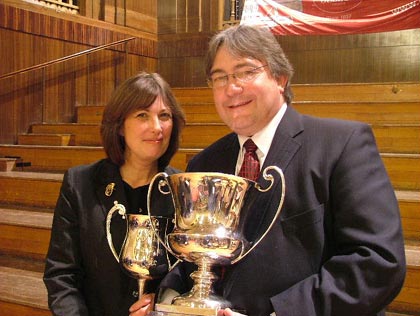
Behind every man...: Lorraine Childs enjoys the winning feeling with her other half
On a day when the contest stage was plunged into the type of eerie darkness associated with the Jules Verne adventure, BAYV switched on their power to take the first prize of £200 and the fine Welsh Regional Challenge Trophy. There were occasions when their musical power supply did flicker and waver throughout their performance, but there was never any doubt that a winning margin of three clear points was what they deserved.
Joining them in London will be Burry Port and Parc and Dare – one, something of a new comer, the other something of old name making a resurgent return. As predictable as it was BAYV winning, the qualification battle was as unpredictable as the weather on the weekend – one minute bright and breezy, the next sharp and cold.
Adjudicator David Read was as clam and collected as ever in his decision making telling 4BR that he had no problem with the winners or runners up, but significant trouble picking the third placed band to make it to the finals at the Royal Albert Hall. "The winners, although not totally secure really did bring the music out from the score in a very fine performance indeed. There was a great deal of quality about their playing today and they gave me what I was looking for."
He also commended Burry Port very highly too. "They gave me a real good marker right at the start of the contest. It was very secure and they also tried to bring the music out from the score. I had no trouble picking them out for second place."
As for the third placed battle. "It was a close run thing between the bands who came third and fourth. I just went for the performance that was more secure overall, although both were very good. One just had that little bit more security in the main solo lines."
The contest itself started a little late after the organisers had managed to get an electrician out to fix the stage lighting which was threatening to become as ‘bible black' as local boy Dylan Thomas would have said as the first signs of darkness crept in over Swansea Bay.
The contest started with the brightest of performances from Burry Port, conducted with real authority by Michael Thorne. A solid start soon developed into a neat and precise opening third of the piece that was notable for the precision of the ensemble work and the security of the main solo lines.
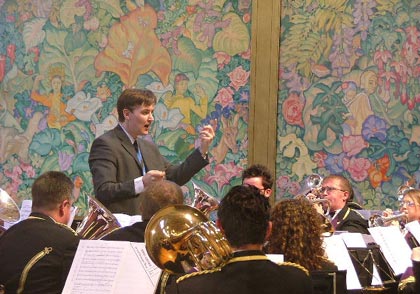
Painting the picture: Michael Thorne and Burry Port deliver the goods
Principal cornet David James and euph Ceri John certainly led the way, but there were also excellent contributions from all other main soloists, most notably in the Day of Rest series of cadenzas. The only momentary problem came with a bass drum that squealed like a pig being poked with a cattle prod, but that was soon overcome with a real sense of style and determination.
The big fight scene was perhaps a touch lightweight, but crucially it was balanced and well delivered, and whilst the final section just felt a little tired and hard in tone, the technique displayed in the ascent passages was the best of the day and the drive to the final chord had the hallmarks of excellent preparation and a real understanding between MD and band. His wishes and directions were admirably displayed by his players on stage and the eventual runners up spot and qualification for London was thoroughly well deserved. They are developing into a formidable outfit.
Abergavenny Borough under the direction of Nigel Weeks was not in the same league (although by a strange quirk of fate they were wearing the same style and colour uniforms as Nigel's former band, Brighouse and Rastrick – did he pinch them when he left them we wonder? Only joking).
The MD was making his first appearance back at the Welsh Regional for nigh on a decade or more, and although he set about to try and make the same type of impression that saw him conduct the winning band here in 1992, he didn't have the resources under his command to do so.
A rather weak opening led to a monochrome first third of the piece that never really came to life as it should, whilst the cadenzas, although bravely attempted were error prone and were not helped by a poor ensemble foundation. The ride for home started well with a cracking bit of bass trom work (there were not too many examples of clarity in the triplet work with this feature all day – plenty of volume and edge to start but then it invariably became flustered and muddled), but once more it became hard and harsh in tone.
The big fight was more mouth and trousers than a scrap between two leviathans of the deep, and a weak ending closed a disappointing performance from a band which has displayed a great deal of promise in the past. 9th place was bang on the money from David Read in the box, whilst Nigel Weeks is learning fast that UK banding isn't as possibly as easy as he thought it might be when he first returned from New Zealand.
BTM then produced what for them was a rather colourless account of the test piece under the direction of their newly appointed MD, Jason Katsikaris.
When BTM are flying they are a very exciting band to listen to, but perhaps they were trying too hard on this occasion to keep to the strict instructions of the MD. The result was a safe, but at times, uninteresting performance that just lacked dynamic variance and that little bit of ‘edge' that so often benefits BTM on stage.
The solo lines were well enough handled (especially in the Day of Rest), but there was a bit of sloppy percussion work that took the gloss off the early sections (and an errant snare drum which hampered the bass duet) and some of the ensemble work lacked balance. A poor start to the final section led to a hard and overblown end, with the fight scene a bit handbags at ten paces. It struck you that given perhaps a couple more rehearsals on the piece with the new MD it would have been more intuitive and rather less mechanical in delivery. 6th was about right in the end though.
BAYV certainly took to the stage in confident manner, but any complacency was soon shock out of their system with a hesitant start. The trademark brilliance of technique soon surfaced in the glissandi, which whooped better than guests at a Mississippi redneck moonshine party and a bass duet that was quite stunning.
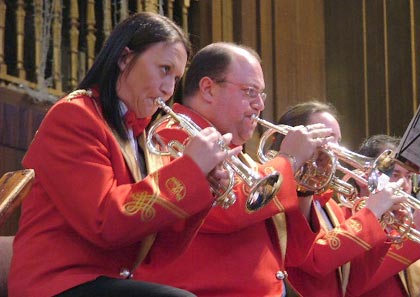
Journey to London: Michelle Ibbotson leads the BAYV back row to Kensington
The hesitancy returned however in the Day of Rest with the usual high class team of soloists not quite 100% in delivery. The dynamic work was startlingly good though and the horn and flugel soon got things back on course with a real sense of despair and longing.
The final ride for home was also not without its clips, with an untidy start. However, the big fight scene was a veritable clash of the titans, with the bass section displaying a huge sound (not just noise, but huge rounded sounds) and a cracking whip through the ascent led to an excellent finish.
There was little doubt it was a very high class performance from the reigning champions, but perhaps subconsciously the competitive edge had been dulled by the fact that the band had little to play for except pride (there was no European qualification place up for grabs either for the winners). This was not quite BAYV on the very top of their form. The win was inevitable, given the overall quality of the performance, but it wasn't quite as good as many listeners could have expected and possibly Robert Childs would have wanted.
Tredegar has displayed an admirable return to form during 2006, but here they showed that the rebuilding process is still very much in progress, and a fair way from being finished.
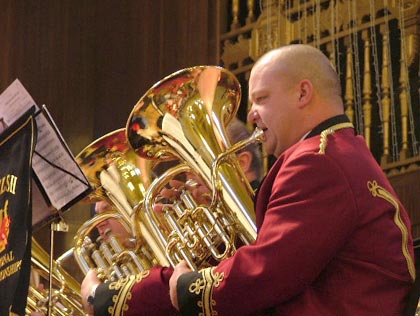
Not quite this time: Tredegar's Darren Morris can't just make it into the qulaification frame
Michael Fowles produced a very musical reading of the score that allowed the main soloists in particular the chance to shine, but also ensured that the band had plenty in reserve to make it to the finishing line without becoming knackered too soon. It very nearly worked, with a fine opening statement leading into a controlled opening third of the piece.
It was error strewn though and at times was uncomfortable, notably in the soprano line. The Day of Rest also had more than its fair share of clips and unforced errors and so by the time it recovered some of its original poise it had haemorrhaged expensive points.
The big fight scene was more Queensbury Rules than bare knuckle fighting, but a strong homeward journey seemed to bring the best out of them once more. Overall it was too much a mixture of the good, the bad and the downright sloppy and although they would be disappointed not to have qualified this year (we had them 3rd, David Read 4th) you couldn't really argue with the decision. Expensive errors cost them a place at the Albert Hall – and they knew it.
Many people thought that Cwmaman may have been the band to possibly push BAYV the closest this year, especially after the progress they had undoubtedly made in the last twelve months or so. Here though they produced perhaps their worst performance in many a year to come home in 8th place.
John Hudson gave the band plenty of time and space to create an impression, but from the word go they seemed uncharacteristically ill at ease. A poor opening third was blighted with errors, sloppy percussion and an awful bass duet, whilst the Day of Rest section recovered somewhat with decent solo contributions (the best being a very fine bit of cornet work by Tim Malpas). The final ride for home though was once again error strewn and harsh in approach right from the opening bass trombone entry, and so by the time they roused themselves for a fine finish (spoilt again by a poor fight scene – both dinosaurs sounded as if they didn't want to come out of their corners) they had blown their chances.
This was a very poor day at the contesting office for Cwmaman who are a much better band than this showing. On a day when many of the fancied bands made too many errors to ensure their qualification for London, this was certainly one of them.
At this point it was fair to say that unless one of the remaining bands really did play out of their skins, then the contest to see who would win the 2006 Regional title was all over bar the shouting. The contest to secure one of the two qualification places though was certainly still very much open.
Burry Port had 90% secured their place for certain, but that last spot was a bit of a toss up between Tredegar and BTM. Beaumaris should have been licking their lips at the prospect of making a return to the Albert Hall for the first time since 2004. However, they blew it – literally.
After an effective start which promised much, they fell into the trap of relying too heavily on volume rather than dynamic variance to create excitement. Glyn Williams was asking a great deal from his band, and for the most part they were delivering, but it was always at a comfortable and then ultimately over enthusiastic level of dynamic sound.
The Day of Rest was the prime example: Here the soloists were secure and effective, but were also too loud, whilst the following section never once created the atmosphere required to instil the thought that the lost hero Axel was at his wits end and full of despair at the thought of him being lost without trace in the subterranean labyrinth. Even the whispering was more like him trying to be heard in a North Wales nightclub on a Saturday night.
It was undoubtedly exciting on the ride for home, but it also hurt the ears at times and was very harsh in tone. The big fight scene was all splash and froth and very little actual fighting, and the final ascent up the Stromboli volcano was pitched at ear piercing level. It got a fine response in the hall, but not so in the box, and 5th place was what it deserved. Just a bit less volume and it could have come closer to a qualification place.
Still that final qualification place was up for grabs, and it was Parc and Dare who surprised many by being the band that finally captured it.
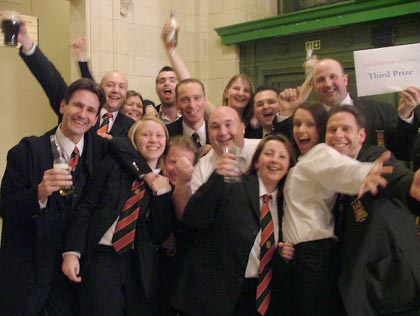
The good times are back! Parc and Dare celebrate in understated fashion!
Parc are one of the most famous names in Welsh banding but haven't tasted success at the top level since 1989 when they last won here and went on to appear at the Royal Albert Hall. They did come in the prizes a couple of years later only to be disqualified for a technical infringement of the rules – they played a dual registered player, but since those days (and ten years after they last had any sponsorship) they returned once more to Kensington after a performance notably for its security and intelligent direction from the MD, Craig Roberts.
This was a performance that never really shone, but never really disappointed either. The soloists were all secure (notably Carl Saunders on principal cornet) whilst the effects and technical hurdles were overcome not with flamboyance but with a workmanlike efficiency. The opening was OK – nothing more, nothing less, whilst the opening third was compact and secure, although a little monochrome in colour and effect. The Day of Rest saw decent solo lines and a solid ensemble foundation whilst the ride for home was not quite 5th gear and high revs, more keeping just under the speed limit and plenty of mirror, signal, manoeuvre.
The big fight wasn't X certificate stuff for certain and the final finish was big but controlled, but given that the likes of Tredegar, BTM and Beaumaris had all come croppers by trying too hard to impress, this made its mark by displaying a degree of security the others more obviously lacked.
We had them 6th on the day, David Read had them 3rd, but as we have said David took the time to explain to both the audience and 4BR that even though he felt he had no problem picking the first two bands, he did have a great deal more trouble separating the 3rd and 4th. When an adjudicator tells you why he made his decision in such a clear and concise manner such as this, it is difficult to disagree with him. Congratulations then to Parc and Dare.
That left just the one performance to round off the contest and Tongwynlais certainly had the ability on paper to gain that trip to London if they played to the top of their form. They didn't.
A deliberate opening led to a rather prosaic opening third of the piece, which although it displayed security in the solo and ensemble lines, didn't really have enough dynamic variance to make it really come to life. It was however the following Day of Rest section that did for them. Here it was not so much the good efforts of the soloists, especially Duncan Broadley on principal cornet (although others did struggle), but the ensemble that ruined the atmosphere. A lack of balance, people falling off parts and poor tuning just made sure points were lost, so by the time a fine bass trom led the band on its way to the end, their chances of qualification were over.
The big fight scene was more reminiscent of a couple of drunks bashing into each other in the doorway of a crowed pub, whilst the over enthusiastic side drummer very nearly obliterated any chance of hearing the band at the end. 7th place was again par for the course.
It ended a contest that never quite lived up to what we were expecting. BAYV were comfortable winners, but were not on the very best of their form, whilst Burry Port certainly were and fully deserved their comfortable runners up spot. They were the one band on the day that certainly played to form. Parc took the honour of the third qualification place with a performance that possibly befitted from the lack of consistency from others, whilst behind them came a litany of missed chances, errors and clips and a tendency to opt for volume rather than sound.
David Read gave a thoughtful and precise analysis of both the piece and the performances from the stage that was well received by the large audience, and whilst the result of the winners was in no doubt, there were a couple of raised eyebrows at the announcement of Parc and Dare in third place. Burry Port gleefully received the announcement as runners up and deservedly so, whilst BAYV took home with them the title for a fifth consecutive year with a hint of relief that although they had avoided any disastrous potentially banana skins here, they had been a bit unsteady on their feet.
They won't want a repeat of that come Belfast, Birmingham or London later in the year.
Iwan Fox















